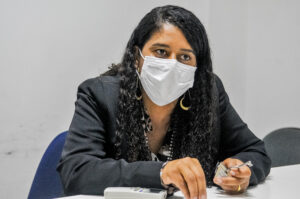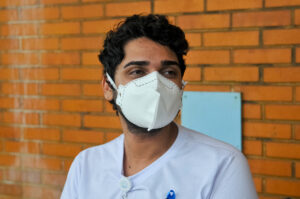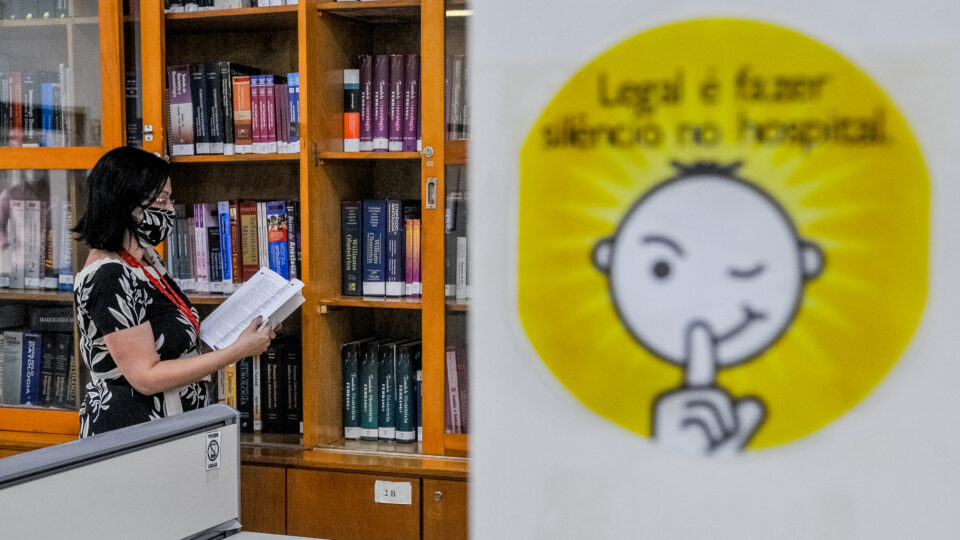When nursing students Ana Aparecida Santos, 23, and Thiago Pereira Desena, 27, who do internships at Materno Infantil Dr. Antonio Lisboa Hospital (HMIB), in Asa Sol, have questions during their appointment, they know exactly where to look. Knowledge: In the library located in the health unit.
“It’s a very complete library. When we are [atuando] In practice, and there is a question, we use the library to search for information”, says Anna Aparecida. This act is considered part of the “internship” period (the last year of the course) for students, when they need to provide feedback about the assistance to be evaluated.
Staff of the Department of Health, residents, medical students and nursing courses at the Foundation for Education and Research in Health Sciences (Fepecs), at the Faculty of Health Sciences (Escs), at the Technical School of Health of Brasilia (Etesb) and related entities have access to specialized health information in the available collection In the preserved libraries of some public hospitals.

The mission is to curate this category with a national and international bibliography of the health sciences. The libraries provide users with the services of publication lending, bibliographic computing, document consolidation and database searches, upon presentation of a card or identity document and proof of business relationship.
According to the Department of Health, three other hospitals, in addition to HMIB, have libraries open to visit. They are: Hospital do Gama Regional (HRG), Hospital da Regiao Leste (HRL) and Hospital Regional de Cielandia (HRC).
Contents
Each library has a collection specialized in the health field. In the case of HMIB, the content focuses on works in pediatrics, obstetrics and gynecology. The objective of the library is to enhance access to information. Since HMIB specializes in these three areas, our group has books with this focus to help servers and students,” explains Estanis Martineli, a librarian for two years at Materno Infantil Hospital.
On average, HMIB serves 240 people per month. In total, there are about 400 titles available on the site, but the combination is always changed due to the possibility that the units will exchange business among themselves, according to the user’s request. Books, articles, course completion papers, CDs, and DVDs are part of the Federal District Department of Health’s Network of Libraries. The available content can be checked on the official website (access here).
In addition to the prints, the space contains three computers with Internet access and a reserved room. The place is preferred by student Thiago Pereira Desena for thematic discussions with fellow students. “I really like the reserved space, because we can discuss in groups. I also consider the group complete, with Brazilian and international books,” says Thiago.

During the pandemic, Lucimar Menezes, another HMIB librarian, noticed a change in the user search profile. “We had a greater demand for bibliographies related to covid-19. We had requests for a bibliographic survey on this topic,” he reveals.
Among the demands were studies on the care of diabetic patients diagnosed with the coronavirus. “This was a novelty. Staff [compostos pelos médicos da SES que dão aula] We sought more during this pandemic period. Our audience in general are students,” Estanis adds.
The health crisis also changed the routine. Users can spend more time with books. Each publication undergoes 40 days of segregation and cleaning before returning to shelves. The limit for people inside spaces has also been changed to avoid clumps.

“Hardcore beer fanatic. Falls down a lot. Professional coffee fan. Music ninja.”



![[VÍDEO] Elton John’s final show in the UK has the crowd moving](https://www.tupi.fm/wp-content/uploads/2023/06/Elton-John-1-690x600.jpg)


More Stories
The Director of Ibict receives the Coordinator of CESU-PI – Brazilian Institute for Information in Science and Technology
A doctor who spreads fake news about breast cancer is registered with the CRM of Minas
The program offers scholarships to women in the field of science and technology